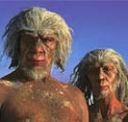|
.
Evolutionary Psychology mind and behaviour |
|
|
Just
what
is Evolutionary Psychology?
Steve Pinker in his 2002 work, "The Blank State" defined Evolutionary Psychology as...
Phylogenetic: Hyperdictionary.com defines Phylogenetic as "relating to the evolutionary development of organisms”.
There are are 2 assumptions contained within
Pinkers
definition of Evolutionary Psychology.
Instead humans at birth have
minds
which are structurally 'pre-adapted' with the mental equipment
neccessary for survival within their social, cultural and physical
environments. Far from being a blank state
our minds are filled with specific neural structures i.e.
domain-specific modules that influence our development and how we
function as human being. Examples of such modules include face
recognition and language acquisition.
The mental modules have been developed through millions of years of human evolution. In particular scientists believe that the period of human evolution during the Pleistocene epoch ie 1.8 millions years to 11,000 years BP has been particularly influential upon the development of these domain-specific modules within the human brain (Bjorklund, 2003, p.837).
The evolution of modern humans is believed to have occurred mostly within an African savannah-type environment during this period. The design and structure of the human mind together with the constituent domain-specific mental modules are the result of 'solutions' to the adaptive problems posed to humans within this environment (via the evolutionary processes of natural selection). Evolutionary Psychology: is a new approach... "Evolutionary
psychology
is an approach to psychology, in which knowledge and principles
from
evolutionary biology are put to use in research on the structure of
the human mind." |
|












